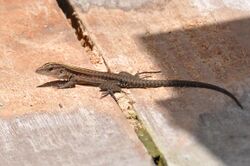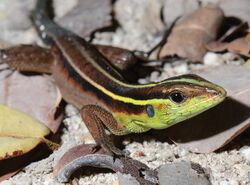Biology:Kentropyx calcarata
From HandWiki
Short description: Species of lizard
| Kentropyx calcarata | |
|---|---|

| |

| |
| in Brazil. | |
| Scientific classification | |
| Domain: | Eukaryota |
| Kingdom: | Animalia |
| Phylum: | Chordata |
| Class: | Reptilia |
| Order: | Squamata |
| Family: | Teiidae |
| Genus: | Kentropyx |
| Species: | K. calcarata
|
| Binomial name | |
| Kentropyx calcarata Spix, 1825
| |
Kentropyx calcarata, commonly known as the striped forest whiptail, is a species of lizard endemic to South America.[1]
Behavior
Kentropyx calcarata commonly participate in communal nesting. While no clear reasoning has been found, a recent study suggested that communally incubated eggs took up less water while also yielding larger offsprings. [2]
Geographic range
The striped forest whiptail lives in the South American countries of Brazil , Bolivia, Venezuela and northeastern South American countries such as French Guiana and Suriname.[1]
Parasites
Kentropyx calcarata specimens are sometimes plagued by the parasitic protist, Plasmodium lepidoptiformis.[3]
References
- ↑ 1.0 1.1 Kentropyx calcarata [1] at the Reptile Database.
- ↑ Filadelfo, Thiago; Dantas, Pedro Tourinho; Ledo, Roger Maia D. (2014-02-10). "Evidence of a communal nest of Kentropyx calcarata (Squamata: Telidae) in the Atlantic Forest of northeastern Brazil". Phyllomedusa: Journal of Herpetology 12 (2): 143. doi:10.11606/issn.2316-9079.v12i2p143-146. ISSN 2316-9079. http://www.revistas.usp.br/phyllo/article/view/74027.
- ↑ Telford SB Jr, Telford SB III. 2003. Rediscovery and redescription of Plasmodium pifanoi and description of two additional parasites of Venezuelan lizards. J. Parasitol. 89 (2): 362-368.
Further reading
- Spix JB. 1825. Animalia nova sive species nova lacertarum, quas in itinere per Brasiliam annis MDCCCXVII – MDCCCXX jussu et auspicius Maximiliani Josephi I. Bavariae Regis. Munich: F.S. Hübschmann. iv + 26 pp. + Plates I-XXVIII. (Kentropyx calcaratus, p. 21 + Plate XXII, Figure 2).
- Uetz P, Etzold T. 1996. "The EMBL/EBI Reptile Database". Herpetological Review 27 (4): 174–175.
Wikidata ☰ Q3013450 entry
 |

